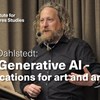application

Ambivalence: A new unified theory about its nature, grounds, and application to normative conflicts
Having mixed feelings about something can help us to deal with conflicts. Since this view on ambivalence challenges traditional approaches that see ambivalence as a flaw, this project aims to develop a new theory of ambivalence.
Do Employers Prefer Fathers? Evidence from a Field Experiment Testing the Gender by Parenthood Interaction Effect on Callbacks to Job Applications
European Sociological Review, 2017, Vol. 33, No. 3, 337–348 In research on fatherhood premiums and motherhood penalties in career-related outcomes, employers’ discriminatory behaviours are often argued
POSTPONED. NEW DATE PENDING. James Fishkin: Democracy When the People Are Thinking: Applications of Deliberative Democracy
Postponed. New date pending. James Fishkin, Professor of Communication, Professor of Political Science (by courtesy) and Director of the Center for Deliberative Democracy, Stanford University. Abstract D
Olle Häggström: Bayesian and non-Bayesian epistemic attitudes, with applications to the atomic bomb, artificial intelligence, covid-19 and existential risk (webinarium)
Olle Häggströmis professor of mathematical statistics at Chalmers University of Technology, researcher at the Institute for Futures Studies and a board member of the Royal Swedish Academy of Sciences
Limited and Mixed Evidence for System-Sanctioned Change to Protect the Environment: A Replication Study
International review of social psychology, vol 37:1 Abstract Feygina and colleagues (2010, Study 3) reported that people who prefer the status quo can be encouraged towards pro-environmental responses w
Comparing Fictitious and Real Persons: Explaining the Unexplained Ethnic Labor Market Gap from Register Data. A Replication of a Randomized Field Experiment in Sweden
Moa Bursell, Department of Sociology, Stockholm University Seminars hosts are Peter Hedström, David Sumpter and Fredrik Liljeros from the Institute for Futures Studies. The seminars are free of charge
A popular misapplication of evolutionary modeling to the study of human cooperation
Evolution and Human Behavior, Volume 38, Issue 3, Pages 421–427. Abstract To examine the evolutionary basis of a behavior, an established approach (known as the phenotypic gambit) is to assume that the b
Anna-Karin Consoli
Head of HR and Office, and Senior Research Coordinator Phone: +46 76-540 12 44E-mail:[email protected] As the head of HR and office, I have the overall responsibility for all HR areas of the inst

Big generative AI - Implications for creativity, art, and artists
Research seminar with Palle Dahlstedt, Professor in Interaction Design at Gothenburg University. In this lecture, Palle Dahlstedt will share a pragmatic, critical, and visionary view of what machine l
Social Science Postdoctoral Researcher to Study the Diffusion of AI
We are looking for a postdoctoral researcher in the project “Predicting the diffusion of AI-applications”.








